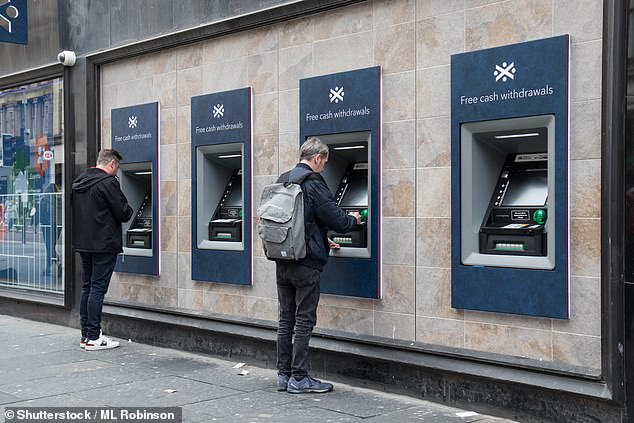Some areas of London and the east of England could be without ATMs within the next two years if the current trend of closures continues, a report warns.
South Cambridgeshire and the London suburbs of Ruislip, Northwood and Pinner are set to have none by June 2026, according to worrying projections from handheld card machine company Merchant Machine.
Cash payments fell to a new low last year, with just 12 per cent of purchases made with coins and notes, trade body UK Finance warns.
Only 2.6 percent of people primarily use cash for their expenses, while two in five people make only one cash payment each month.
But three in four people said they still used an ATM last year even though the number of ATMs was declining.
John Howells, chief executive of ATM network group Link, said that while cash use continues to decline, it remains vital for millions of people.
Some areas of London and the east of England could be without ATMs within the next two years if the current trend of closures continues (File image)

According to worrying projections, south Cambridgeshire and the London suburbs of Ruislip, Northwood and Pinner would have none by June 2026 (file image)
“Even though people are moving away from cash, our network is still issuing £1.6 billion a week,” he said.
“We remain absolutely committed to ensuring that people can access cash for free.”
The Financial Conduct Authority (FCA) said yesterday that from September 18, banks will have to assess whether local communities lack access to cash services, including bank branches and ATMs, and plug significant gaps.
Under the rules, the FCA will not be able to prevent a bank branch from closing, but it will be able to delay its closure until additional cash facilities, such as banking centres, become available.
Sheldon Mills, chief executive of the FCA, said: ‘Three million people still rely on cash, even as digital payments become more popular.
“We have acted quickly in response to the new powers given to us by Parliament to ensure that reasonable access to cash withdrawals and deposits is maintained.”
This comes after new research revealed that around 25 million Britons aged 16 or over (45 per cent) do not carry their wallets with them when they go out and rely solely on their digital wallets as a payment method.
Millennials and Gen Z were found to be the most likely to leave their cards and wallets at home, with 66% and 72% respectively admitting to going out with only their phones. In comparison, only one in four baby boomers (23%) and one in ten members of the silent generation (11%) said they would feel comfortable leaving home with only a phone as a payment method, even if it was only for a short period of time.

